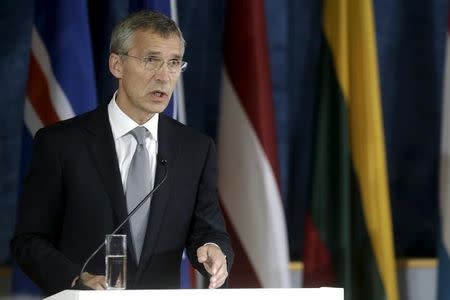Turkey urges NATO to keep up its Patriot defenses
By Robin Emmott, Sabine Siebold and Phil Stewart BRUSSELS (Reuters) - Turkey urged its NATO allies on Thursday to keep up missile defenses along its Syrian border, after Germany and the United States said they would press on with plans to withdraw Patriot batteries despite worries about Russian actions in the area. NATO is still waiting for allies to fill the gap left by the U.S. and German pull-out - and the lack of replacements has raised questions about the alliance's strategy along the frontier, especially after Russian jets violated Turkey's air space over the weekend. NATO's secretary-general said on Thursday he was prepared to send forces to defend Turkey. But Washington and Berlin's withdrawal of missiles has left only Spain with Patriots there, and Madrid made it clear it did not want to act alone. NATO first deployed its Patriot missiles along the border in January 2013, to shoot down any missiles from Syria's conflict fired into Turkish territory. Ankara's NATO envoy appealed to the U.S.-led alliance on Thursday to maintain that defense system, according to two people briefed on closed-door talks in Brussels. Asked during a break in that meeting whether it was the right time to withdraw the missiles, U.S. Defense Minister Ash Carter said it was a decision taken "many months ago". "It has a purpose, which is to bring the unit back where it is going to be modernized. That is a long-standing issue," Carter told reporters. Germany's defense minister said Berlin would also go ahead with plans to switch off its Patriot batteries in Turkey next week and withdraw most of the soldiers operating them before Christmas. All soldiers and material are due to be withdrawn by the end of January. "This decision (to withdraw the Patriots) is right," Ursula von der Leyen said as she arrived for the meeting. "The question is what danger can be warded off in which way," she said. The comments appeared to suggest that the Turkish air force was capable of intercepting fighter jets. INCURSIONS The incursions of two Russian fighters in Turkish air space on Saturday and Sunday has brought the Syria conflict over NATO's borders, testing the alliance's ability to deter a newly assertive Russia without seeking direct confrontation. As Russian and U.S. planes fly combat missions over the same country for the first time since World War Two, NATO is eager to avoid any international escalation of the Syrian conflict that has unexpectedly turned the alliance's attention away from Ukraine following Russia's annexation of Crimea last year. Spain still has batteries in place, but insisted it would not be left alone to cover such a wide area. "What we are not going to do is be the only battery, as that would stop being effective. Everyone understands that," said Spain's Defense Minister Pedro Morenes. France and Italy are understood to be willing to join Spain, but no decision has been taken, people familiar with the discussion say. Officials at the U.S.-led alliance are still smarting from Russia's weekend incursions into Turkey's air space near northern Syria. In public comments, NATO chief Jens Stoltenberg says the alliance's support of its 28 allies was unwavering. "NATO is ready and able to defend all allies, including Turkey against any threats," he said. "NATO has already responded by increasing our capacity, our ability, our preparedness to deploy forces including to the south, including in Turkey," he said, noting that Russia's air and cruise missile strikes were "reasons for concern". While the United States has ruled out military cooperation with Russia in Syria, NATO defense ministers will discuss how to encourage Russia to help resolve the crisis, betting that Moscow also wants to avoid being bogged down in a long conflict. For 40 years, NATO's central task was deterring Russia in the east during the Cold War, but now, after a decade-long involvement in Afghanistan, the alliance is facing a reality-check close to home, with multiple threats near its borders. France and Britain, NATO's two main European powers, are understood to be willing to see the alliance use its new 5,000-strong rapid reaction force beyond NATO borders, potentially helping stabilize post-conflict governments in Libya or Syria. (Additional reporting by Kate Holton in London; Editing by Louise Ireland)



